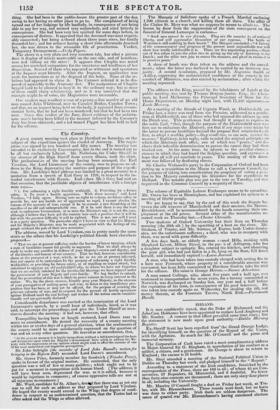The address to the King, passed by the inhabitants of
Leeds at the public meeting, was sent by Thomas Benyon junior, Esq., the Chairman, to Lord Melbourne, the Principal Secretary of State for the Home Department, on Monday night last, with 17,490 signatures.._ Leeds Mercury.
At a meeting of the friends of Captain Wood, at Huddersfield, on Friday last, a letter was read from the Premier, addressed to a gentleman at Huddersfield, one of those who had opposed the address against the Dutch war. This gentleman had thought it proper to express to the noble Earl, "that, though the purpose of the Huddersfield men was firm not to embarrass the Ministry, yet that if any steps were taken by the latter to pursue hostilities beyond the purpose first entertained—in fine, to adopt a warlike policy—they would rise, as one man, against the measure." Earl Grey, in his reply, calls to mind the original principles on which the Ministers took office, one of which was "peace;' and declares their inflexible determination to pursue the course they had then tracked out. At the same time, he adverts to the peculiar circumstances in which they had found, the Belgian question, and expresses a hope that all will yet conclude in peace. The reading of this document was followed by deafening cheers.
Sir Charles Wetherell's party in the Corporation of Oxford had been getting up a requisition to the Mayor to call a Common Council, for the purpose of taking into consideration the propriety of voting a petition to his Majesty condemning his Ministers for the expedition to Holland. This notable plan was put to the vote on Tuesday, and was negatived in the Common Council by a majority of three.


























 Previous page
Previous page